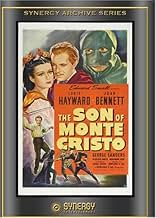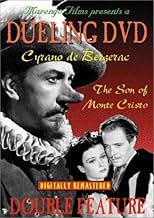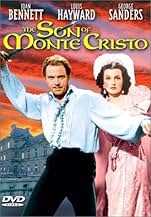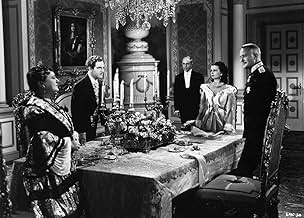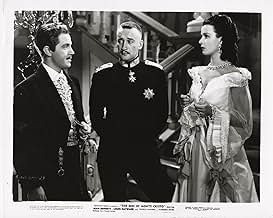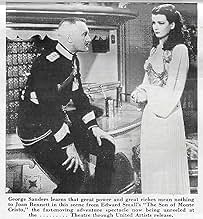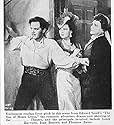Agrega una trama en tu idiomaGeneral Gurko Lanen is the dictator of Lichtenburg, a country set in the Balkans. With the help of Napoleon II, the rightful ruler Grand Duchess Zona aims to overthrow the general. She is al... Leer todoGeneral Gurko Lanen is the dictator of Lichtenburg, a country set in the Balkans. With the help of Napoleon II, the rightful ruler Grand Duchess Zona aims to overthrow the general. She is also helped by the visiting Count of Monte Cristo.General Gurko Lanen is the dictator of Lichtenburg, a country set in the Balkans. With the help of Napoleon II, the rightful ruler Grand Duchess Zona aims to overthrow the general. She is also helped by the visiting Count of Monte Cristo.
- Dirección
- Guionistas
- Elenco
- Nominado a 1 premio Óscar
- 1 nominación en total
- Conrad Stadt
- (as Ian Mac Wolfe)
- Dirección
- Guionistas
- Todo el elenco y el equipo
- Producción, taquilla y más en IMDbPro
Opiniones destacadas
Full of intrigue, swashbuckling and occasional moments of romantic byplay, it's handicapped by Bennett's ice princess manner of performing in these costume roles as a damsel in distress--beautiful but expressionless. LOUIS HAYWARD, on the other hand, is very animated and charming in the title role, showing prowess with the swordplay and finally getting the upper hand in a duel of wits and swords with Sanders.
It's enjoyable but full of deja vu for those who've seen other swashbucklers of this ilk. FLORENCE BATES has a few wry moments as Bennett's maid, and MONTAGU LOVE is effective as a wrongly imprisoned nobleman.
The musical score by Edward Ward is helpful in sustaining an air of adventure but certainly not one of his more notable scores.
Summing up: Standard entertainment that must have made Saturday matinée audiences happy in the '40s--but it's all just too familiar with no original touches.
While this is pretty typical fare of its type, that doesn't make this swashbuckler any less entertaining. This certainly manages to capture one's interest and imagination throughout, its supporting players even proving more than up to said task particularly Ian Wolfe as Stadt and Montagu Love as Baron Von Neuhoff. In the end, while this does deliver the expected goods in terms of lush scenery, a dashing daring do lead hero in Hayward and a devious, devilishly clever lead villain in Sanders, exciting climactic swordplay and further action and intrigue and even perhaps some symbolism of the political intrigue at work in the world at the time this was filmed, it really offers up very few actual surprises and proves far too predictable overall. Regardless, this proves a most enjoyable film experience.
Bennett is effective as the spirited Grand Duchess, and Hayward has a juicy role as the young Count, which gives him the chance to assume a different persona every so often during the course of the story. As the brutally ambitious general, Sanders's appearance is quite a bit different from the more familiar look he has in his best-known roles, but his voice and mannerisms are easily recognizable, and he comes across with a good blend of suavity and menace.
The story has the Grand Duchess being held at the mercy of the general, with the Count eagerly getting involved in the fictional country's affairs. The story has many turns and mild surprises, and it does a rather resourceful job of coming up with new predicaments and developments to keep things going. Most of the plot devices are familiar from other sources, but they are pieced together with skill, and its very good as light entertainment.
George Sanders is superb as the ruthless Gurko Lanen, but a performance of this calibre in the role of the villain holds the danger of overbalancing the film in the absence of a totally outstanding performance on the part of his opponent. But the introduction of Louis Hayward's slender, charming Monte Cristo as an outsider into the cliche'd Ruritanian mix proves to be the vital spark that not only saves the film but catapults it to rank as a joyous classic of its genre. As Gurko Lanen sardonically observes, it is an adversary with a sense of humour who is dangerous.
No-one could claim originality for the plot. There are strong echoes of 'The Mask of Zorro' to be found, as our well-born young hero alternates the pose of a fop - suffering the scorn of his ladylove - with the role of masked defender of the downtrodden masses. But expectations are constantly subverted; like its title character, the film has the endearing knack of not taking itself too seriously.
This is one hero, for all his skill, who has been known to lose when launching himself gaily into battle against overwhelming numbers of his rival's henchmen; who takes his nom de guerre at the whim of a moment from the banner heading of an underground news-sheet; who shrugs off his enemy's imprecations and his lady's upbraiding both alike, with a merry grin; who clearly takes enormous enjoyment in sending himself up by playing the part of a foppish banker to deflect General Lanen's suspicions. In a nod to the Dumas original, the tool that gains him access to the General's plans and confidence is the prospect of a banking loan from the fabled Monte Cristo fortune, and despite his title the young Count is able to point out that, like Gurko Lanen, Edmond Dantes the elder was a self-made man.
For, if the hero is not entirely infallible - and all the more likeable for it - neither is the villain entirely without our sympathy. As we see in the opening scenes, Lanen is neither a fool nor a coward, and despite his cultured suavity he is the son of a stonemason, and proud of it; a gifted peasant who has dared to aspire, first to the rulership of his tiny country, then to the hand of the greatest lady in the land, the Grand Duchess herself. It is not a romance that the audience can possibly favour - the would-be suitor is too old, too brutal, too jaded to be a suitable match for young Zona - but it is hard not to wince at the haughty manner in which his courtship is dismissed. To this viewer at least, the proposal sounded genuine, evoking the old proverb that 'if she would not take him, still the lady might make him' - but any possibility for redemption is lost by the all-too-evident contempt of the Grand Duchess for the low-born upstart General.
(And I never could see why Baron von Neuhof's arrest for plotting to bring in Louis Napoleon's troops in order to return his own faction to power gets dismissed as "trumped-up charges", when Lanen's last-ditch resort to a similar bargain with the Tsar is trumpeted as a vile betrayal of his country....)
It's obvious from the start that this is one villain who is going to give the hero and his allies a run for their money; and so he does. Monte Cristo's flattery doesn't fool the General for an instant, though he is prepared to tolerate the fop as long as he remains useful, and the identity of the spy who ultimately betrays 'The Torch' has been skilfully established from the very first scenes. As soon as Lanen's suspicions are aroused he contrives, with only a little manipulation of those most loyal to his audacious guest, to discover both his secret identity and his concealed escape route in time to have him arrested and thrown in jail.
Ruthless and resourceful to the very last, Gurko Lanen keeps us gasping as he gambles everything to achieve his aims. Yet above all, it is Louis Hayward, in the irrepressible part of Edmond Dantes the younger (surely a kindred spirit of Simon Templar?) who really brings the picture to life. It will take all the wit and daring of an opponent as ingenious and endearing as the Son of Monte Cristo to stop the General... with a little help from Zona, who at the crucial moment yet again subverts the genre by saving herself!
Bloopers are few, although the Grand Duchess' achievement in adhering side-saddle behind her rescuer on the rump of a galloping horse is little short of miraculous, as is the apparent availability of sticky tape in 1865 for silencing the mouth of the Russian ambassador! During Lanen's balcony speech, a distant off-stage voice can faintly be heard prompting him line by line; while it's not beyond the bounds of possibility that the character would have had a prepared speech 'cued' to him in that situation, I somehow doubt that this was intentional :-)
¿Sabías que…?
- TriviaThirteen years after making this film, in which he played the villainous ruler of a fictional country called "Lichtenburg" (an obvious combination of the real-life small countries Lichtenstein and Luxemburg), George Sanders played a sympathetic role in the musical film La embajadora (1953), also set in Lichtenburg.
- ErroresThe wedding invitation is for Wednesday, May 25, 1865. May 25, 1865, was a Thursday.
- Citas
Edmund Dantes Jr.: I'm worn out climbing in and out of windows and up and down chimneys. It'll be such a relief to go through an ordinary door again.
- ConexionesFeatured in Sprockets: Masters of Menace (1995)
Selecciones populares
- How long is The Son of Monte Cristo?Con tecnología de Alexa
Detalles
- Fecha de lanzamiento
- País de origen
- Idioma
- También se conoce como
- The Son of Monte Cristo
- Productora
- Ver más créditos de la compañía en IMDbPro
- Tiempo de ejecución1 hora 42 minutos
- Color
- Relación de aspecto
- 1.37 : 1
Contribuir a esta página



